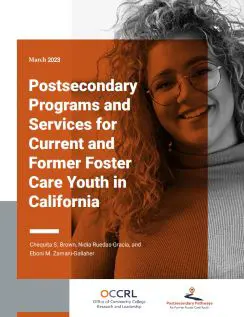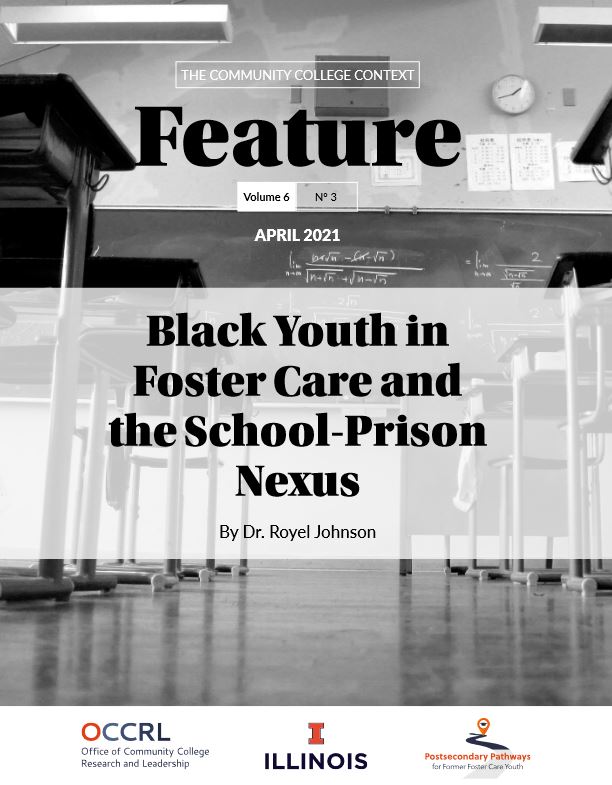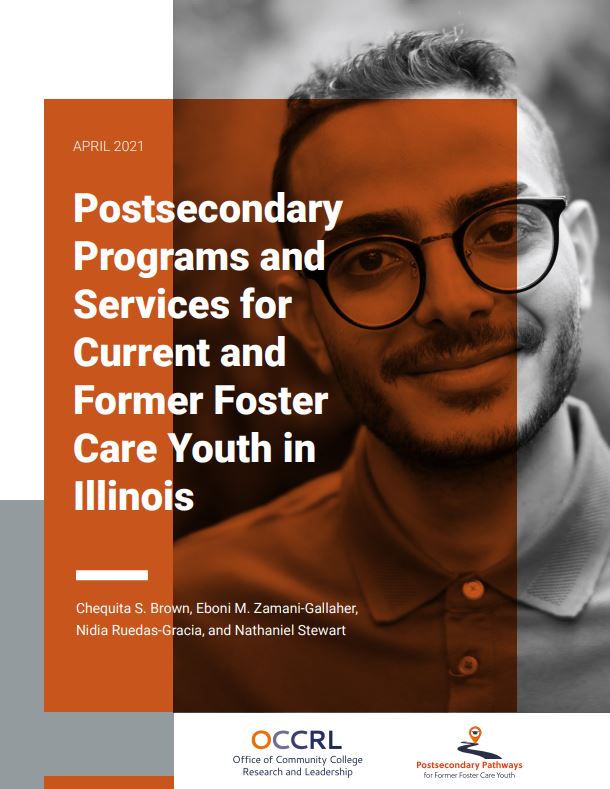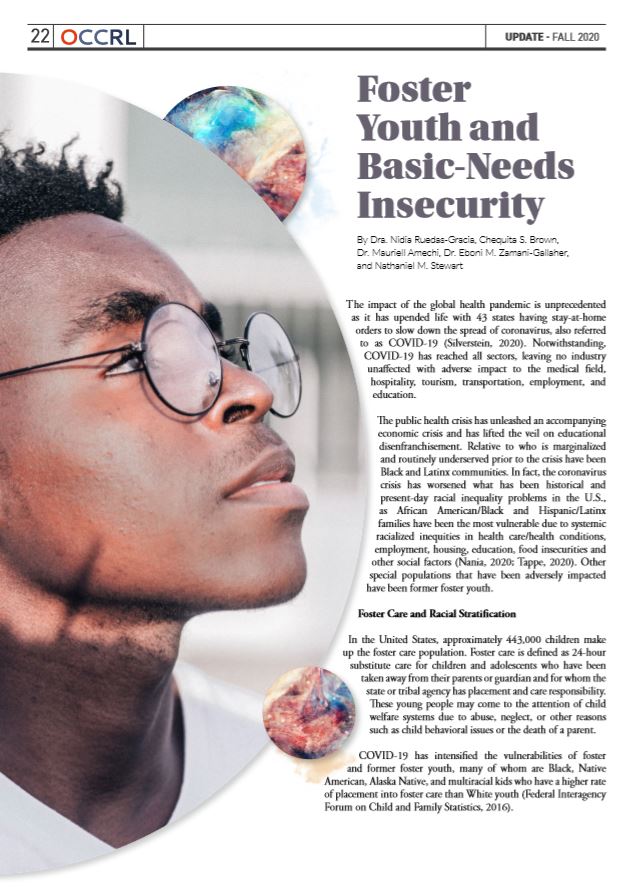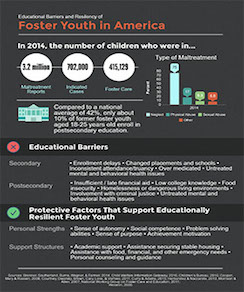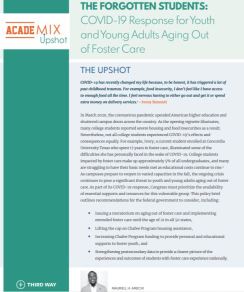
Postsecondary Pathways - for Former Foster Care Youth
This project has been completed and is no longer active.
However, we hope you are able to utilize its resources.
The Postsecondary Pathways for Former Foster Care Youth (PP-FFCY) reflects OCCRL’s commitment to examining and developing postsecondary pathways that support mobility for first-generation, underserved, and minoritized populations, as well as strengthening career pathways to promote seamless transitions from college to careers. This project endeavors to examine postsecondary access, opportunities, and supports for foster youth in Illinois and other states across the county in addressing access and outcomes of FFCY in Career Technical Education (CTE).
Purpose
The Postsecondary Education Pathways for Former Foster Care Youth (PP-FFCY) project is an exploratory study focused on postsecondary pathways for current and former foster youth in Illinois. OCCRL is conducting a comprehensive-needs assessment that provides a descriptive profile of current and former foster youth populations in Illinois; examines postsecondary access, opportunities, and supports for foster youth in Illinois; and addresses disparities in career and technical education (CTE) programs. This project reflects OCCRL’s commitment to examining and developing postsecondary pathways that support mobility for first-generation, underserved, and minoritized populations as well as strengthening and supporting career pathways to promote seamless transitions from college to careers.
Resources
OCCRL aims to increase postsecondary awareness, access, and attainment for current and former foster care youth by providing information on programs and other resources that offer holistic support and services. View the list of postsecondary programs and services.
Strategies to Cultivate a Foster-Friendly Culture on Community College Campuses
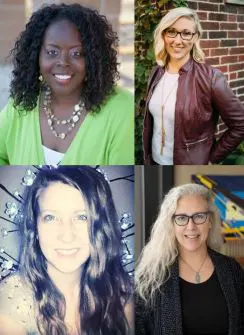 In this episode, Chequita Brown talks with Kate Danielson of the organization Foster Progress, as well as with Anna Wandtke and Tricia Wagner of Rock Valley College in Rockford, Illinois. The group discusses how to cultivate a foster-friendly culture at Illinois community colleges.
In this episode, Chequita Brown talks with Kate Danielson of the organization Foster Progress, as well as with Anna Wandtke and Tricia Wagner of Rock Valley College in Rockford, Illinois. The group discusses how to cultivate a foster-friendly culture at Illinois community colleges.
Navigating College as a Foster Care Alum
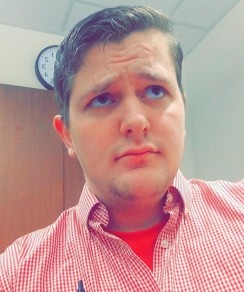 In this episode, OCCRL research assistant Chequita S. Brown talks with Jonathan Stacy, a sophomore at Heartland Community College who is pursuing his studies and a possible career in criminal justice.
In this episode, OCCRL research assistant Chequita S. Brown talks with Jonathan Stacy, a sophomore at Heartland Community College who is pursuing his studies and a possible career in criminal justice.
Listen to the podcast and view the transcript.
Key Elements to Successfully Connecting Foster Care Youth to Educational Resources for Postsecondary Success
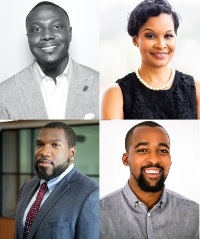 In this episode, Nathaniel Stewart talks with Mauriell Amechi, Regina Gavin Williams, and Blayne Stone Jr. about how the transitions and pathways to postsecondary education are similar and different for Black former foster care students. The scholars also discuss key elements to successfully connect foster care youth to educational resources that help advance the postsecondary education opportunities for this student population.
In this episode, Nathaniel Stewart talks with Mauriell Amechi, Regina Gavin Williams, and Blayne Stone Jr. about how the transitions and pathways to postsecondary education are similar and different for Black former foster care students. The scholars also discuss key elements to successfully connect foster care youth to educational resources that help advance the postsecondary education opportunities for this student population.
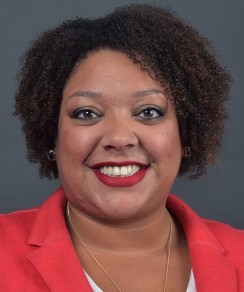
Maddy Day
The Impact of Campus-Based Support Programming on Foster Care Collegians' Postsecondary Access and Retention
In this episode, Chequita Brown of OCCRL talks with Maddy Day about the Fostering Success initiative in Michigan and the impact of campus-based support programming on foster carecollegians' postsecondary access and retention.

Patricia Palmer
How Youth-in-Care in Illinois Can Access Educational Resources to Pursue a Postsecondary Education
In this episode, OCCRL research assistant Chequita Brown continues the conversation on foster care youth by talking about with Patricia Palmer about accessing available resources in Illinois for youth-in-care who want to pursue a postsecondary education.
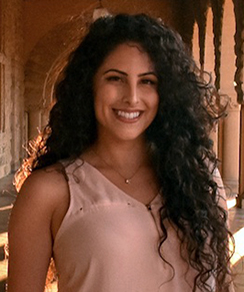
Nidia Ruedas-Gracia
Conceptualizing 'Sense of Belonging' Among Students From Historically Minoritized Racial Groups Within Higher Education
In this episode, Colvin Georges Jr., a research associate at OCCRL, talks with Dr. Nidia Ruedas-Gracia about what it means to have a sense of belonging and discusses her research in this area. They also discuss how a sense of belonging affects college students from historically minoritized racial groups.
Postsecondary Programs and Services for Current and Former Foster Care Youth in California
By Chequita S. Brown, Nidia Ruedas-Gracia, and Eboni M. Zamani-Gallaher
This brief highlights postsecondary programs and services in California that support youth in care, in addition to young adults who are aging out of foster care. Read more.
Tracking College-to-Career Pathways for Foster Youth
By Chequita S. Brown
In this OCCRL Thought Paper, Chequita S. Brown relates how tracking the data of students with foster care experience helps to recognize them as a legitimate student population. She offers recommendations on how to do this and conveys the many obstacles that can hinder the academic and career success of foster youth. Read more.
Black Youth in Foster and the School-Prison Nexus
By Royel Johnson
In this OCCRL Feature Brief, Dr. Royel Johnson argues that the foster care system, and more specifically congregate care facilities, are part and parcel to the enhancement of carceral state power. Read more.
Postsecondary Programs and Services for Current and Former Foster Care Youth in Illinois
By Chequita S. Brown, Eboni Zamani-Gallaher, Nidia Ruedas-Gracia, and Nathaniel M. Stewart
This research brief provides an overview of programs and services that helps strengthen postsecondary pathways for current and former foster youth in Illinois. Read more.
Foster Youth and Basic-Needs Insecurity
By Dra. Nidia Ruedas-Gracia, Chequita S. Brown, Dr. Mauriell Amechi, Dr. Eboni Zamani-Gallaher, and Nathaniel M. Stewart
This article discusses how COVID-19 has intensified the vulnerabilities of foster youth and former foster youth, many of whom are Black, Native American, Alaska Native, and multiracial children who have a higher rate of placement into foster care than White youth (Federal Interagency Forum on Child and Family Statistics, 2016). Read more.
(From the Fall 2020 UPDATE on Research and Leadership)
Exploring Equity in Postsecondary Education
By Heather L. Fox, Eboni M. Zamani-Gallaher
This chapter examines how postsecondary practitioners are encouraged to work collaboratively with child welfare agencies and other community-based organizations to identify and implement culturally responsive supports for former foster youth to promote early academic achievement. Read more.
The Forgotten Students: COVID-19 Response for Youth and Young Adults Aging Out of Foster Care
By Mauriell H. Amechi
This policy brief outlines recommendations for Congress to consider regarding the country's COVID-19 response, in an effort to prioritize the availability of essential supports and resources for youth and young adults who are aging out of foster care. Read more.
Two-Day Campus Seminar Covers Learning and Development in Classrooms
The Illinois campus welcomed Dr. Camille A. Farrington in November as a keynote speaker of the two-day seminar "Creating Social Impact: Enhancing Skills for Educators and School-Based Community Service Personnel."
The event was jointly sponsored by the School of Social Work, the Bureau of Educational Research in the College of Education, the Interdisciplinary Health Sciences Institute, and the Center for Prevention Research and Development.
K-12 educators and school social workers in Illinois who attended the seminar were able to earn three and a half continuing-education units or professional development hours.
Day One: How Schools and Classrooms Shape Learning and Development
Dr. Farrington is an expert on educational equity in American high schools and the impact of “noncognitive” factors on the academic performance and development of young people. Her work as a senior research associate and managing director at the Consortium of School Research at the University of Chicago focuses on achieving equity and reforming policies and practices in urban high schools. Farrington is also the author of Failing at School: Lessons for Redesigning Urban High Schools.
On day one, Farrington discussed how classrooms shape learning and development. She encouraged participants to view high school settings as “developmental” spaces versus “educational” ones. This outlook sparked her own interest in discovering methods to intentionally cultivate a developmental learning environment.
Farrington challenged the assumption that students are responsible for their own learning, as well as the idea that it’s their job to take steps to acquire and make sense of the information imparted through classroom learning. She explained how the psychosocial preoccupations of school-aged youth are not focused on academic content, knowledge, and skills but rather center on identifying development that explores personalized questions (Who am I? Where do I belong? What am I capable of? Can I be successful?). Farrington said academic learning will conflict with students’ psychosocial preoccupations unless educators find ways to help young people address and satisfy such questions.
Furthering this idea, the scholar shared five noncognitive factors that contribute to student learning: 1) academic behaviors, 2) academic perseverance, 3) academic mindsets, 4) learning strategies, and 5) social skills. Farrington addressed the need to examine young people’s skills, attitudes, and behaviors to discover how they learn within their environments, and the impact of learning environments on their academic motivation and performance.
She said cognition, emotions, and social connections are all tied together, making people’s performance and work ethic connected to feelings. When it comes to students’ academic performance, Farrington said academic perseverance stems from their feelings—how they perceive themselves and what they’ve been asked to do. Therefore, employing a positive academic mindset can improve their behavior and performance. Farrington identified four first-person academic mindsets, which she said contain compelling evidence related to positive academic performance among high school students:
- I belong in this academic community.
- My ability and competence grow with my effort.
- I can succeed at this.
- This work has value to me.
Farrington said the more students adopt these academic mindsets and believe they are true, the more they will persevere and, ultimately, improve their academic performance.
Farrington also related how educators can impose personal beliefs and opinions about students by discussing who is motivated to learn and who isn’t, and who is a good student versus who doesn’t care about school. She said classroom environments shape how students cultivate positive academic mindsets. For example, the idea of belonging in an academic community, as noted in the academic mindsets related above, is directly connected to the type of classroom atmosphere the teacher creates.
Also, students’ abilities and competencies can grow with effort if educators allow space for students to persevere. Farrington said teaching a lesson once, followed by an exam and a new lesson, is not a process that leads to improvement or a growth mindset. Teachers, therefore, have an incredible influence on classroom environments and can foster conditions that support motivational mindsets.
Day 2: Digging Into the Science of Learning and Development
The second day of the seminar consisted of a two-hour workshop on the science of learning and development, emphasizing the role educators have on the beliefs, behaviors, academic performance, and development of youth. After the lecture participants interacted in a thought-provoking activity and had a concluding discussion.
Dr. Farrington began her talk by posing a crucial question that drew varied responses among attendees: What skills or qualities are most important for young people to be successful? Expanding on that inquiry, she proposed three more questions: What skills or behaviors are essential for promoting the success of young people? When do these skills or behaviors develop? How do they develop?
Social identities are another important facet to reflect on when discussing students’ learning and development, according to Farrington, because students have varying social identities and teachers play a significant role in shaping them. Public education, she said, should strive to shape young people who can fully participate in the civic, social, and economic life of their communities, thus achieving success as young adults.
A positive developmental outcome, however, depends on three key factors. The first factor, Farrington said, is “agency,” which is a student’s ability to pursue his or her own choices in life. The second factor, “integrated identity,” is based on students’ ideas of who they are and which groups they belong to. Given that individuals have various social identities, it is important for students to experience an integrated identity that combines them all. The third factor is “socially valued competencies,” meaning the capabilities students possess and ones that are valued in society.
To bridge these factors, Farrington highlighted several foundational components of student development that are necessary for attaining success: mindsets, values, self-regulation, knowledge, and skills. She reiterated the power of a positive student mindset and said it is important to instill an environment of self-efficacy.
At the same time, cultural and social knowledge should be embedded within learning environments. These elements are central to stimulating student success, but the education system can be neglectful when it comes to advancing them. Farrington said schools tend to pay the most attention to self-regulation, knowledge, and skills but should consider all components to accomplish positive developmental outcomes.
Farrington said that how people make sense of an experience determines how they will develop from it. Humans are constantly formulating meanings and constructing and reconstructing their understanding of themselves, the world, and others. When students are younger, meaning for them is created by parents, teachers, and other adults. But as children age, it is important they learn to make sense of the world on their own.
Development is fostered for youth through different experiences. Farrington explained there are two types of experiences that can be cultivated in the classroom: “Action experiences” include encounters, tinkering, choosing, practicing, and contributing; and “reflection experiences” include describing, evaluating, reflecting, envisioning, and integrating.
The traditional theory of learning often neglects the learner."
Focusing and reflecting on students and their experiences shapes young learners and assists or inhibits their successes. These processes are critical in creating an environment in which students are encouraged to grow and develop. The traditional theory of learning, however, often neglects the learner.
“We’re in an old system that does not reflect what we know now about learning and development,” Farrington said.
Farrington challenged participants to think differently about teaching and posed the idea of teaching being redefined as curating developmental experiences for learners. Improvements have been made to the current education system, she believes, but there is a long way to go before strong developmental outcomes for all students are achieved. Ensuring success for young adults means modifying the current methods of educating and eliminating the barriers to implementation, as well as creating a more student-centered system that concentrates on learning and development.
For more information about Dr. Farrington’s ideas presented in this the seminar, check out “Teaching Adolescents to Become Learners: The Role of Noncognitive Factors in Shaping School Performance” (2012), a comprehensive research review that illustrates how noncognitive factors interact with school and classroom contexts to affect students’ academic achievement.
